Cruz And Rubio Clash, Everyone But Cruz Clashes With Trump, In Fifth Republican Debate
The Fifth Republican Debate, and the last of 2015, was marked by expected clashes between the candidates, and one that never happened.
The Republican candidates for President met last night in a debate, well two debates if you count the undercard, in which frontrunner Donald Trump once again was largely the focus even when he wasn’t on the stage and Marco Rubio and Ted Cruz continued the battle that had begun to some extent in the last debate but has now taken on new meaning as they battle for the position of second place behind Trump:
Donald J. Trump came under sustained attack from Jeb Bush and other Republican presidential candidates on Tuesday night as they united against his plan to bar Muslims from entering the United States while tussling over who would be toughest in protecting Americans from terrorist threats.
+Senator Marco Rubio of Florida also faced his toughest moments of the race during the latest Republican debate as a top rival, Senator Ted Cruz of Texas, repeatedly questioned his conservative credentials and his judgment on national security and immigration. Though Mr. Rubio at times seemed to gain the upper hand, he looked and sounded rattled as Mr. Cruz portrayed him as lining up with liberals like Senator Chuck Schumer of New York in favoring “amnesty” for immigrants who are in the country illegally.
Mr. Bush, the former Florida governor who is struggling in the polls, was withering as he assailed Mr. Trump’s harsh words and ominous warnings about Muslims and mosques since the mass shootings in Paris and San Bernardino, Calif. While Mr. Trump has managed to channel and stoke the fears of many Americans, Mr. Bush led his rivals in portraying him as a fearmonger more interested in scaring voters than in planning an effective war against the Islamic State.
“Donald, you’re not going to be able to insult your way to the presidency — that’s not going to happen,” Mr. Bush said. “Leadership is not about attacking people and disparaging people. Leadership is about creating a serious strategy.”
Mr. Trump, who has belittled Mr. Bush’s energy and strength since entering the race in June, suggested that his rival was simply pretending to be tough. But his counterattack seemed to backfire, drawing a rebuke from the audience.
“With Jeb’s attitude, we will never be great again, that I can tell you — we will never be great again,” Mr. Trump said, to loud boos.
In the evening’s other major subplot, Mr. Rubio, who has increased his attacks on the surging Mr. Cruz over the last month, engaged his colleague in their most pointed face-to-face confrontation yet. Trying to defuse criticism over his leading role in the 2013 legislation to offer unauthorized immigrants a path to citizenship, Mr. Rubio asserted that Mr. Cruz also wanted to offer legal status to those immigrants.
Mr. Cruz said Mr. Rubio was trying to “muddy the waters” and “raise confusion,” and linked Mr. Rubio to Mr. Schumer and President Obama on the issue.
“I led the fight against his legalization and amnesty” bill, Mr. Cruz said, arguing that to claim his and Mr. Rubio’s records on the issue were the same was “like suggesting the fireman and the arsonist have the same record because they were both at the scene of the fire.”
But when pressed by Mr. Rubio and a moderator on whether he would rule out legalizing undocumented immigrants, Mr. Cruz appeared to leave himself a measure of space.
“I have never supported legalization, and I do not intend to support legalization,” he said.
The exchanges between Mr. Rubio and Mr. Cruz, who have emerged as leading candidates recently, highlighted the party’s most glaring divisions: on immigration, intelligence gathering and foreign intervention.
Mr. Rubio has positioned himself as a Republican who would have been at home in the George W. Bush administration, a hawk on national security but a pragmatist on immigration. (He has, though, backed off his support for a comprehensive immigration overhaul in the face of scathing criticism from the right.)
Mr. Cruz, by contrast, has tried to run as a post-Bush Republican, taking a hard line on immigration while seeking a middle ground between the party’s interventionists and libertarians on defense issues.
After Mr. Rubio tried to portray him as soft on national security, Mr. Cruz linked him to Democratic foreign policy on crises like Libya.
“One of the problems with Marco’s foreign policy is he has far too often supported Hillary Clinton and Barack Obama undermining governments in the Middle East that have helped radical Islamic terrorists,” Mr. Cruz said. “We need to focus on killing the bad guys, not getting stuck in Middle Eastern civil wars that don’t keep America safe.”
The clash between Cruz and Rubio took up a major portion of the evening on a host of issues ranging from immigration to the National Security Agency’s metadata program to debate over immigration policy, during which Senator Cruz hit Senator Rubio several times as a support of “amnesty” thanks to his involvement in the passage of the 2013 Senate immigration bill. On several occasions, Kentucky Senator Rand Paul, who is struggling to maintain the relevance of his own campaign, joined in with Cruz in attacking Rubio on foreign policy and defending Cruz from Rubio’s attacks on the metadata program, largely because Cruz and Paul generally agree in their opposition to the program that was in place prior to November 30th of this year. Cruz, meanwhile, came under attack from Rubio and others over his proposal to “carpet bomb” ISIS and finding out if sand can glow in the dark, an allusion that many took to suggest that he might not be averse to using nuclear weaponry against ISIS notwithstanding the fact that the group has largely ensconced itself in areas that are largely populated by civilians. For the most part, it seemed as though both Cruz and Rubio scored the jabs that both of them went into the debate wanting to against the other, what impact all of it will have on the direction of the race is another question. In Iowa, where the Republican electorate tends to be very conservative, Cruz probably helped himself a bit while Rubio’s jabs at Cruz’s positions on foreign policy and surveillance may have undermined that support at least to some degree. As for Rubio, he probably helped himself to some degree in New Hampshire, where he has generally been doing much better than Cruz in capturing the second place position behind Trump. Overall, though, it’s unclear that the debate will have as much of an impact on the Cruz-Rubio battle as either candidate may have hoped, especially since it comes on the eve of a two week period in which voters are likely to begin tuning out politics in favor of the holidays.
While the expected battle between Cruz and Rubio went about as expected, what was notably missing from the debate last night was any sign that the long-standing detente between Donald Trump and Senator Cruz would be coming to an end notwithstanding the fact that Cruz is now seriously challenging Trump in Iowa and has slipped firmly into a second place position in the national polls. Instead of any expected clash, though, Cruz and Trump continued their seemingly copacetic public relationship that one analyst described as some kind of weird political buddy movie:
Any expectation that Mr. Cruz and Mr. Trump would clash was snuffed out when Mr. Trump was read back his criticism of Mr. Cruz from last weekend — when he called Mr. Cruz “a maniac” — and retreated from it.
“He’s just fine,” Mr. Trump said, reaching over to pat Mr. Cruz on the back. “Don’t worry about it.”
Earlier, Mr. Cruz engaged Mr. Trump in a bit of bonhomie, joking that he would build a border wall, “and I’ll get Donald Trump to pay for it.”
“I’ll do it!” Mr. Trump responded.
The Washington Post summarized the Trump-Cruz non-clash like this:
The exchange everyone was expecting — between Cruz and Trump — came and went with no points scored. Cruz had criticized Trump at a private fundraiser last week, suggesting that there were legitimate questions about whether the billionaire businessman had the judgment to be president.
When the issue was raised near the end of the debate, a smiling Trump mockingly warned Cruz not to attack. Cruz ducked the question, saying the voters will have to make judgments about all of the candidates’ qualifications, temperament and judgment. Once again, the two men — who have avoided going after each other — maintained their unusual alliance.
The reasons behind this apparent decision by both Trump and Cruz to lay off attacking each other, which has been in place since long before Cruz was a real contender in the race, is something that political analysts have been speculating about for months now, and the fact that neither candidate even made an effort to go after the other last night is only likely to cause that increase. Given the fact that Trump and Cruz did meet in person on several occasions over the summer, and even co-hosted a rally against the Iran nuclear deal in September, have led some to speculate that they have some of informal agreement between the two of them to refrain from attacking and instead concentrate on taking out the other candidates in the race in anticipation of the idea that, by March or April, the field will be largely clear and both of them will have enough delegates in their respective pockets to have a clash make sense without risking that anyone else can benefit from it. That’s something we may never or, or at least won’t know until the campaign is long over, but it’s not beyond the realm of possibility that both campaigns have come to this conclusion independently and that they’re basically acting in concert even without the existence of any kind of formal “agreement.” Whatever the reason, the fact that neither one of them is going after each other, at least not yet, is certainly one of the odder developments of this campaign so far.
If Ted Cruz refrained from going after Trump, other candidates did not. In perhaps what may have been the only real highlight of the undercard debate, South Carolina Senator Lindsey Graham went after Trump, and especially his plan to bar Muslims from the country, quite aggressively to the point where many suggested he should have been included in the main debate just to see him clash with Trump on that issues, and on Graham’s assertion that Trump is wholly unprepared to be Commander in Chief. Jeb Bush, who has clashed meekly with Trump in past debates, went after him aggressively this time around, at one point referring to him as the “chaos candidiate,” while Trump largely responded to Bush by pointing out that his poll numbers are higher in an exchange that seemed more akin to a schoolyard insult-fight where Trump was saying “mine is bigger” than an exchange between candidates for the nation’s highest office. Rand Paul, who only made the main stage due to the fact that CNN essentially bent its rules to let him slide in under the wire, also went after Trump on both his immigration plan and his proposal to “control” the Internet, a proposal that Trump once again failed to provide any detail about. Trump also took fire, although to a lesser extent, from Chris Christie, John Kasich, and Carly Fiorina, but it was Bush who took the most aggressive shots at the frontrunner and it will be interesting to see if we see him move in the polls at all because of it.
Getting beyond the Cruz-Rubio-Paul clash, the lack of a Trump-Cruz clash, an the attacks on Trump by others, I tend to agree with Nate Silver that the debate ended in a “nine way draw” and that the other candidates largely did okay but probably didn’t do very much to help themselves break out of their current positions. The one exception to that rule was, arguably, Ben Carson who seemed to continue to confirm all the reasons why his poll numbers have been tanking for the better part of a month now. At one point, in response to comments Carson had made about bolting the party, Carson referred to the Chairman of the Republican National Committee as “Reince Pubis,” which was either another example of Carson’s mallapropisms or a Freudian slip of repeating a manner of referring to Chairman Preibus that has been used as an insult by many on the right. New Jersey Governor Chris Christie hit hard on many of the themes that have helped him rise significantly in New Hampshire, but it’s unclear if the performance will help him much beyond the Granite State. John Kasich and Carly Fiorina, meanwhile, were about the same as they have been in the other debates, and it seems unlikely that they’ll see their numbers move much at all. As for the undercard debate, other than Lindsey Graham, who was entertaining even when I completely disagreed with him, the candidates in that debate were completely underwhelming and it seems clear we are at the point where there does not need to be an undercard debate at all.
The question going forward, of course, is what impact all of this will have on the race. As I said in the preview post yesterday afternoon, this was basically the last chance that these candidates had to make an impression on voters before voters start to tune out for the holidays. The next Republican debate won’t be until just under a month from now when Fox Business Network carries a debate from South Carolina, which will be followed quickly by another debate in Iowa on January 28th in Iowa that will be covered by Fox News Channel. After that, we will be diving right into voting with the Iowa Caucuses on February 1st and the New Hampshire Primary on February 9th. We’ll likely get some idea of what impact the debate has had later this week and over the weekend since I suspect at least a few outlets will put some polling in the field to get a post-debate/pre-holiday snapshot of the race, but there won’t be much polling or, probably, much political news over the holidays and it will be hard for candidates struggling to get ahead in the polls to make any real progress until normal coverage resumes after New Year’s Day. My suspicion is that we’ll see very little movement in the polls, and that is likely to inure to the benefit of the candidates at the top nationally and the first two primary states, Donald Trump, Ted Cruz, Marco Rubio and, possibly in New Hampshire, Chris Christie. The rest of the candidates strike me a being close to the point where they’re out of luck.
If you missed the debates and have any desire to watch them, you can find the video at the link.
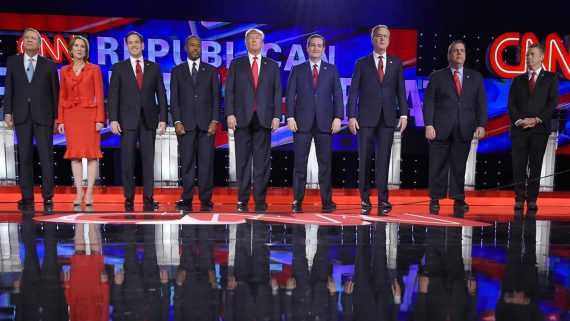

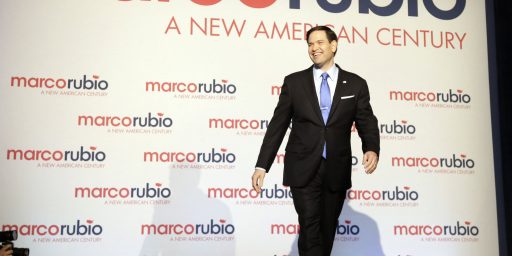
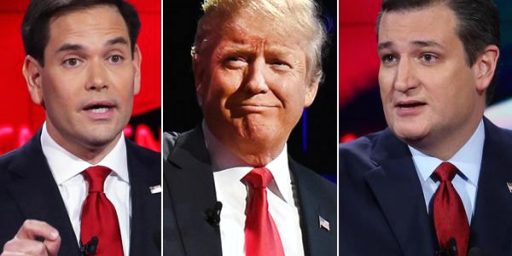
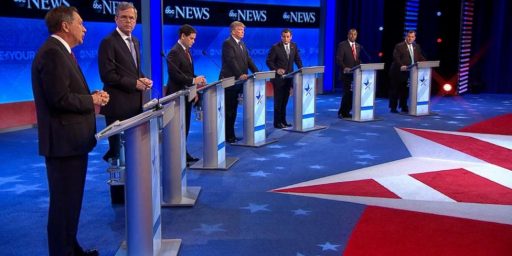
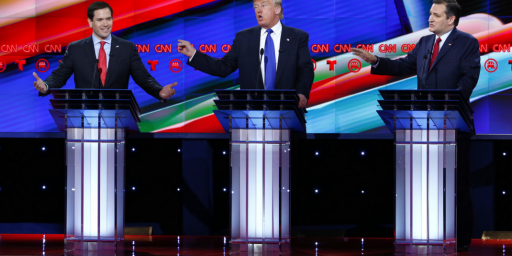
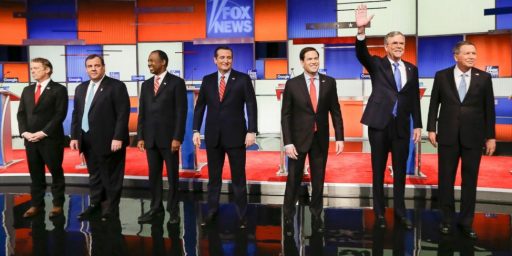
Thank you Doug for watching and reporting on this catfight and letting me use the time instead for something more in touch with reality, namely reading an old fantasy book.
On the Trump-Cruz thing, Trump seems smart enough to realize that the race will eventually come down to him and a not-him and understands Cruz is about the weakest not-him for which he could hope. Cruz is loathed by every Republican in the U.S. Senate but one, has enthusiastically aligned himself with some of the worst stuff coming out of House Republicans and can’t possibly compete with Trump when it comes to personality or likability.
Mike
Perhaps Daesh was the real winner of last night’s debate…
Felt like everybody was out for Rubio’s perfectly-coiffed scalp. He didn’t exactly make a great case for being the nominee. On the other hand, Cruz made no frickin’ sense. He said, and I’m definitely paraphrasing from memory ’cause God forbid I watch that again, that we had to carpet-bomb political correctness to win against ISIS. He clung to that theme like a drowning sailor to driftwood in the first hour. But he did better at making tenuous connections with buzzwords, so naturally he’ll do great.
First hour felt like they were all competing to be in a Michael Bay movie.
@An Interested Party: One of the best tweets I’ve seen:
Link
The only thing to be learned from last night’s debate is that Wolf Blitzer is an ineffective moderator.
Amy Davidson over at the New Yorker has a write-up. She calls them “principle-free” and boy is she right.
Whee. Mad Hatter’s tea party from Alice in Wonderland, anybody?
@Grumpy Realist:
Looking for a worthwhile new fantasy book? I’m trying to spread the word about Graydon Saunders’s “Commonweal” series. Two books so far. The first is very good; the second is excellent — but neither is ever going to find a wide general audience. There are some decent reviews online, if you’re interested.
Not one of the craven fools on that stage is qualified to be President of these United States.
Trump remained a buffoon. I really don’t understand why being on stage with professionals hasn’t completely destroyed him before now, and so I cannot imagine anything happening now. But, he did get booed, so maybe.
Bush seemed feisty and petulant, which was a big, big improvement from previous debates.
Ted Cruz demonstrated that he can pretend to not view people with contempt and loathing. If he can do it with Trump, perhaps he can do it with America.
Rubio was completely innocuous, but the only one who projected any optimism. You could see him playing the part of the President in a junior high school play.
Carson was completely ignorant. People like that in a President.
Rand Paul and Christie both mostly stayed on the sidelines, and tossed a few insults at Trump.
Fiorina was completely unlikable, shrill in her complaints about not getting enough questions, and when she did speak, nearly everything she said was a lie. I can see her poll numbers going up.
In contrast, Kasich was making an excellent case for why you need a more mature, flexible and serious person in the White House, and completely ripped apart Christie at one point. So, he continues to be doomed.
@Pch101: I liked Wolf’s “would you kill innocent civilians?” question for Carson, and wish he had pressed Cruz on whether he would use nuclear weapons.
Also, he should have brought out a group of Syrian children, and asked the candidates to feast on their bones.
@Gustopher:
I got the distinct impression there was a sizable Paulite faction in the audience.
I appreciated Dan Drenzer’s take on the debate:
“No, what was startling about the debate was just how so many candidates could say so may wrong things about American foreign policy in two hours.”
(snip)
“By my count, only two candidates didn’t say anything flatly wrong about foreign policy the whole night: Jeb Bush and Rubio. The former fumbled too many of his lines to matter in the primary and the latter is barely treading water in the polls. Oh, and both of them were far more hawkish on the use of force in the Middle East than the other candidates, which is less than comforting.”
@Gustopher:
That was Hugh Hewitt, not Wolf Blitzer.
And Hewitt, being the wingnut who he is, framed it incorrectly.
“That is what war — can you be as ruthless as Churchill was in prosecuting the war against the Nazis?”
The idiot Hewitt apparently doesn’t know that the US is a signatory to the Geneva Convention of 1949, which prohibits attacks on civilians. That was not in effect during WWII, when Churchill was PM and nobody had precision long-range bombing capability.
He may as well as have asked Carson, “Are you willing to violate international law in order to fight the big, mean terrorists? Because that’s what nutjobs like me want you to do.” These clowns have no respect for accuracy, or decency, or for the rule of law that they like to talk so much about.
@Pch101: oh, and they’ll all profess loudly about how “Christian” they are.
Who would Jesus bomb?
@Grumpy Realist:
What gets me most of all is that Hewitt is a law professor. He’s supposed to know the law, yet he apparently doesn’t know or doesn’t want to know. Not that Chapman is a particularly good law school but this is pretty basic stuff.
It’s similar to Cruz going off about how we should religious tests for office when that is undoubtedly unconstitutional, or Rubio boasting that accused terrorists won’t have Miranda rights in his administration when treason is an offense addressed in the Constitution and those accused of it are provided the same due process protections as every other defendant.
These right-wing voters who claim to have some monopoly on respect for the Constitution and the rule of law know nothing about them, otherwise they wouldn’t tolerate this nonsense. This is not a matter of right vs. left, but illegal vs. legal.
@Gustopher: Ignored was the economy and the looming crisis and collapse.
Have you dug your bunker yet Ty?
From $39,000 to $4,200,000! And despite the looming crisis they will take American Money! (SUCKERS!)
http://www.risingsbunkers.com/pricing-and-floor-plans/
@Pch101: Yah. I keep squawking to people as to WHY we have treason defined in the Constitooshun: because the Founding Fathers knew enough history to point at the horrible Schrechlichkeit that happens when you don’t. (cough, 15th and 16th century Italy).